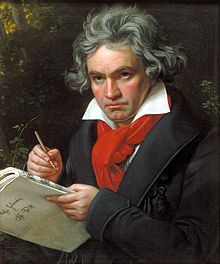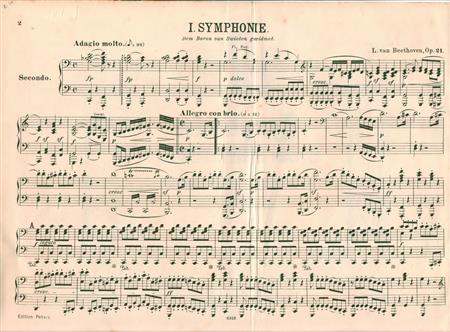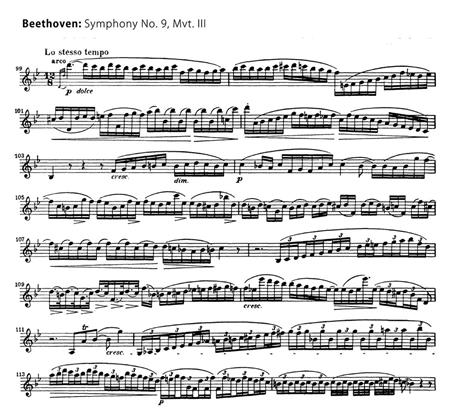 |
| Portrait by Joseph Karl Stieler (en.wikipedia.org/wiki/Ludwig_van_Beethoven ) |
Ludwig van Beethoven was a musician who composed several masterpieces and made a great impact in musical history. As a child, he was an average student in school, but he was gifted in his musical talent. However, his life growing up was not perfect, and did not go on as one might think. Because of his musical talent, he suffered terribly in his early years, which was caused majorly by his father, Johann van Beethoven, who saw his talent as an advantage in conducting a new "Mozart". But luckily, fueled by just not his father, but also by his own passion, the effort he put in his early years brought him to an era of successful music production and performance. Succeeding in his career, he received more opportunities and invitations, but meanwhile, his hearing gradually got worse. This dramatic change impacted his life negatively, because as a musician, he was no longer able to compose according to sounds. However surprisingly, he still continued composing music collections without the use of instruments, and even mastered Ode to Joy, in the final movement of his Ninth Symphony. Despite his fame and popularity, only a minority of people acknowledge this fascinating composer for who he really is. A hero must be able to not only accept, but also overcome all the challenges in his or her life. Beethoven's perseverance and positiveness helped him overcome his childhood and challenge his physical disorder. Beethoven was not a genius or flawless being, but despite his shortcomings, his ability to overcome the obstacles and have a positive outlook on life makes him a hero that inspires many people around the world.
Beethoven's perseverance as a child is a demonstrable trait to the world. In Beethoven's early years, he had to face many obstacles that many young people at his age could not face. Instead of falling to the obstacle, Beethoven in contrast overcame his childhood difficulties, and became a successful musician and composer even when under pressure. An article titled "Ludwig van Beethoven" Biography.com wrote, "Beethoven...struggled with sums and spelling his entire life, was at best an average student, and some biographers have hypothesized that he may have had mild dyslexia" ("Ludwig van Beethoven." Biography.com). Many historians claim that Beethoven was not intelligent in school because of his dyslexia, however, this hardship did not affect his passion towards music. In fact, together his passion and natural gift for the arts lead him to be able to comprehend highly-leveled music at a young age. However, what really was the major challenge of young Beethoven was that "his father, a tenor in the electoral musical establishment, harbored ambitions to create in his second son a prodigy like Mozart" ("Ludwig van Beethoven" Biography.com). Johann van Beethoven, Beethoven's father, placed high hopes on his son. He anticipated Beethoven to be at the level of Wolfgang Amadeus Mozart, another Classical Period pianist. According to Edmund Morris's Beethoven the Universal Composer, "Neighbors of the Beethovens--who were now living in a larger apartment in the Rheingasse--recall seeing a small boy 'standing in the front of the clavier and weeping.'...his father would beat him...waking him up at midnight for more hours of practice...Beethoven the man never criticized his father" (Morris 16). Beethoven's alcoholic father would accomplish his wish by forcing Beethoven to practice piano for countless hours, and beat him if Beethoven did not met his orders. But Beethoven did not complain about this rough period of time. He simply continued his passion towards music despite a rough childhood, and eventually became a well-known pianist and composer. Beethoven's perseverance caused him to never gave up his passion for music.
 |
| One of Beethoven's earliest works (http://www.classicfm.com/composers/beethoven/guides/beethoven-20-facts-about-great-composer/) |
Beethoven always held a positive belief towards life, no matter what challenges he encountered. For example, later in his adulthood, Beethoven, when he aware that he was completely deaf, did not stop composing, but instead challenged his physical condition, which paid off to the creation of many of the most beautiful and universal Classical pieces that musical history has ever heard of. On the website article, "Ludwig van Beethoven", the author wrote, "Somehow, despite his tumultuous personal life, physical infirmity and complete deafness, Beethoven composed his greatest music -- perhaps the greatest music ever composed -- near the end of his life" ("Ludwig van Beethoven." Biography.com). Many people often times discriminate against people with such disabilities, deeming them as incompetent especially in the music world. However, this was not the case with Beethoven. Even after losing the ability to hear, he challenged himself and lastly created "Ode the Joy", "the greatest music ever composed" in his entire career ("Ludwig van Beethoven". Biography.com). In another article also titled "Ludwig van Beethoven", it mentions "Ode the Joy" as the product of "his lifelong ambition to compose [such a piece].' [which was] realized at last in the Ninth Symphony" ("Ludwig van Beethoven"). Beethoven created a miracle in history by being a deaf but successful composer. His "Ode to Joy" created an entirely new universe of music for the later periods (for example, the Romantic Period of Music and Contemporary Period of Music). Edmund Morris, a British-American writer, also stated in his bibliographic book: "More and more, he "listened" through his spectacles, avidly scrutinizing written questions and answering them while the pencil was still moving. When his works were played in rehearsal, he watched the movement of bows and fingers, and could instantly tell when a player departed from the printed text. He relied less and less on the piano for composition." (Morris 202-203). After accepting his lack of hearing, Beethoven found himself capable of composing without depending on the piano. By that time, Beethoven successfully defeated his deafness. Beethoven's positiveness towards life helped him overcome the difficulties in his life, creating a heroic image and positive impact for many people today.
 |
| Beethoven's modern version of Symphony 9 (http://www.free-scores.com/download-sheet-music.php?pdf=8824) |
Beethoven is a hero because his perseverance and positiveness influenced many people. His story inspires people to continue to reach for their dreams despite one's life growing up. He is an inspirational figure to the world because he encourages others to face the challenges in life. In Edmund Morris's book, he stated "Challenge, to Beethoven, was inspirational: the more difficult a problem, the more it excited him. 'Difficulty is beautiful, good, great'" (Morris 207-208 qtd. Ludwig van Beethoven). Beethoven established a heroic model, inspiring others to overcome obstacles that once seemed impossible to defeat. He possessed a positive attitude toward the challenges he faced in his life. Beethoven may not be the flawless, perfect musician people sought him to be, but he was able to defeat the obstacles in his life, which inspires many young musicians today like myself. He encourages me to continue the musical dream whenever I meet challenges in learning music. Not only does he remind me to keep pursuing my goals in music, but also to boldly reach towards my ambitions throughout life despite the adversities I will face. As Beethoven said, "I will seize fate by the throat; it shall certainly never wholly overcome me". Beethoven's "Ode to Joy" will always be an extraordinary encouragement and have a deeper meaning to me as it embodies this very quote, and is a testament through history to this promise he made to himself. The story behind Beethoven and his song "Ode to Joy", though not known, will reach out to those who have been able to get the chance to know.
Works Cited
"Ludwig van Beethoven". Biography.com, A&E, Television Networks.
Edmund Morris. Beethoven The Universal Composer, Atlas Books and HarperCollins
Publishers.
"Ludwig van Beethoven." Encyclopedia of World Biography, Gale, 1998. Biography in Context,
link.galegroup.com/apps/doc/K1631000534/BIC1?u=powa9245&xid=8c9a43ae. Accessed 2 May 2017.
Page created on 5/24/2017 12:00:00 AM
Last edited 12/13/2017 2:03:09 AM
